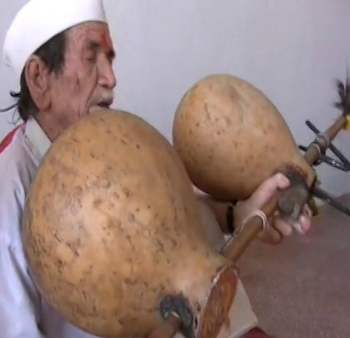
Tribal cultural heritage of Gujarat >>
VADODARA: Now, you will be able to peep into the life of tribals and even hum some of their songs. The Bhasha Research and Publication Centre (BRPC), which has taken up a project for documentation of tribal music of India, has begun from Gujarat. […]
The CD and the book – ‘Adivasi Adim Sangeet’ were launched during a function held at Sir Sayajirao town hall at Akota by eminent Gujarati composer and singer Purshottam Upadhyaya. Renowned vocalist Prachi Dublay has rendered tribal songs along with tribals – Naran Rathwa and Nita Rathwa in the CD. It is an attempt to present Rathwa, Dehvali and Gamit wedding compositions sung originally by adivasi women of Gujarat in their traditional way.
The digital map of tribal music of Gujarat, which is in the form of an audio-visual interactive system, shows music and dance forms of 16 tribal communities of the state. In all, 260 songs and around 62 dance forms of tribal communities, be it of Charan community or communities like Rathwa, have been displayed in this map which also provides a brief information of the locations where this communities are settled in the state.
Conceptualized by founder of Bhasha centre trust, professor Ganesh Devy, the audio visual interactive has been created through the efforts of BRPC and the Adivasi Academy, Tejgadh. “This effort at documenting adivasi songs, dances and musical instruments of Gujarat, has been carried out by adivasi students, staff and faculty of the Adivasi Academy,” Devy said. He told media persons that the interactive system will help laypersons to reconnect with the adivasis of the state. […]
“We have made this effort with an aim to revitalize these traditions within the tribal communities as well as to bring it to wider audiences to create an understanding and appreciation of tribal cultural traditions,” said Devy.
Source: In a first, tribal music of Gujarat is digitized – Times of India, 6 November 2011
Address : http://articles.timesofindia.indiatimes.com/2011-11-06/vadodara/30366193_1_tribal-music-bhasha-research-publication-centre
Date Visited: Sun Apr 28 2013 12:04:43 GMT+0200 (CEST)
“The great diversity of music in India is a direct manifestation of the diversity and fragmentation of the population in terms of race, religion, language, and other aspects of culture. […] The songs vary in detail, not only from one region to another, but also within a region among the different strata of society.” – NA Jairazbhoy in “Tribal, Folk and Devotional Music” >>
“Religion is a personal matter and should not be politicised.” – Invitation by the Bharat Jodo Abhiyan (BJA) – a civil society platform involving organisations from across 15 states – extended to all like-minded citizens “who take pride in our progressive, inclusive civilization and are committed to our constitutional values of fraternity, liberty, equality and justice” | TheWire (2 January 2024) >>
“The tribes and castes in India are communities apart. Those who belong to castes belong to no tribes, and those who belong to tribes are outside the caste pyramid. What brings them together is probably their love for songs.” – Ganesh Devy in What unites Indians is a love for songs | Caste | Publications >>
Learn more
Adivasi Academy & Museum of Adivasi Voice at Tejgadh
Appropriate education for Adivasi children – the Vidyodaya School model
Childhood | Children’s books | Childrens rights: UNICEF India | Safe search
Childrens rights: UNICEF India
Convention on the Rights of the Child: The children’s version | Unicef
eBook | Background guide for education
eBook | Free resources for rural education and health care – Unicef
eBook | “Where the mind is without fear”: Tagore, Gitanjali and the Nobel Prize
Education and literacy | A View of Higher Education in India | Right to education
Forest Rights Act (FRA) | Illegal mining
Health and nutrition | Recommendations by the Expert Committee
Multi-lingual education & Central Institute of Indian Languages (CIIL)
Multilingual education is a pillar of intergenerational learning – Unesco
People’s Linguistic Survey of India | Volumes (PLSI) | PeoplesLinguisticSurvey.org
Rabindranath Tagore: a universal voice – Unesco
RSV School & Museum of Santal Culture (West Bengal)
Scheduled Tribes (ST) | Success story
Tribal Children’s Right to Education in India
Unesco | Unicef | Unicef India | United Nations
United Nations International Days and Weeks
Video | “Nations don’t make us human – languages make us human”: Ganesh Devy
Women | Safe search | President Droupadi Murmu on women’s empowerment